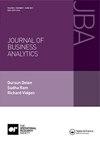电价合约转换决策的实证模型
IF 1.7
Q3 COMPUTER SCIENCE, INFORMATION SYSTEMS
引用次数: 1
摘要
在本文中,我们探讨了电力合同之间切换的时机对当前和过去价格的敏感性。我们提出了一个个体二元决策的时间序列模型,该模型依赖于过去和现在价格的历史。该模型基于贝叶斯学习过程,而贝叶斯学习过程是序列决策的核心。给定以世界状态为条件的信息的先验分布,我们表明该模型以一种直接的方式捕获了对过去价格的依赖。我们用最大似然法估计了一个瑞典家庭样本的模型参数,这些家庭在一段时间内决定竞争的电价合同。估计的参数表明,家庭确实通过在合同之间切换来对价格做出反应,并且对于替代价格过程,对价格的反应可能相当大。重要的是,模型结构表明,一般来说,对价格变化的反应不会是立即的,而是延迟的。本文章由计算机程序翻译,如有差异,请以英文原文为准。
An empirical model of the decision to switch between electricity price contracts
ABSTRACT In this paper, we explore how sensitive the timing of switches between electricity contracts is to current and past prices. We present a model for time series of individual binary decisions which depends on the history of past and present prices. The model is based on the Bayesian learning procedure which is at the core of sequential decision-making. Given a-priori distributions of the information conditional on the state of the world, we show that the model captures dependence on past prices in a straightforward fashion. We estimate by maximum likelihood the parameters of the model on a sample of Swedish households who decide over time between competing electricity price contracts. The estimated parameters suggest that households do respond to prices by switching between contracts and that the response to price can be sizeable for alternative price processes. Importantly, the model structure implies that in general, the response to a price change will not be immediate but delayed.
求助全文
通过发布文献求助,成功后即可免费获取论文全文。
去求助
来源期刊

Journal of Business Analytics
Business, Management and Accounting-Management Information Systems
CiteScore
2.50
自引率
0.00%
发文量
13
 求助内容:
求助内容: 应助结果提醒方式:
应助结果提醒方式:


